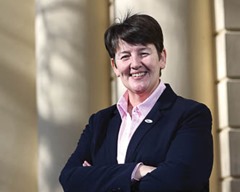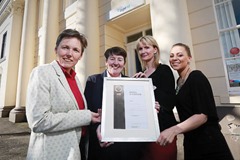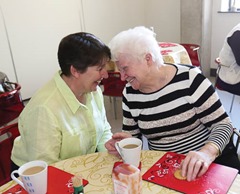Standing at the crossroads now
 Age NI Chief Executive Linda Robinson discusses how we are standing at a crossroads of the ageing agenda in Northern Ireland with Owen McQuade, and why the choices we make on the proposed Active Ageing Strategy, tackling age discrimination, early intervention and prevention are key to all our futures.
Age NI Chief Executive Linda Robinson discusses how we are standing at a crossroads of the ageing agenda in Northern Ireland with Owen McQuade, and why the choices we make on the proposed Active Ageing Strategy, tackling age discrimination, early intervention and prevention are key to all our futures.
“We certainly believe that we’ve had a significant impact upon the ageing agenda,” Linda Robinson reflects as she assesses Age NI’s progress since coming into being in 2009. “However, with the number of over 65s set to increase by 63.3 per cent from 279,100 in 2013 to 455,700 in 2033, there is much to do to ensure a better late life for people today and tomorrow.”
These are challenging times in many respects. The ageing demographic, set against a backdrop of continuing austerity, welfare reform and ageist attitudes, signifies greater demands on people’s income, health and well-being. Age NI’s focus is to support the growing and varied needs of older people.
It does so through advice and care for individuals needing support; policy and influencing to change the context of ageing now and in the future; and support for older people’s groups to ensure greater voice, engagement and social inclusion at regional and local levels.
“Longer life is definitely something to be celebrated,” emphasises Robinson. “Indeed, many older people report that they lead vibrant, fulfilling, dignified, independent and engaged lives. However, in stark contrast, Age NI hears daily from older people who find it difficult to cope, with four in ten telling us they struggle on their income and more than one in ten skipping meals to cut back on food costs.”
Age NI seeks to be a voice “particularly for those who aren’t able to put forward how they feel and how they are ageing in our society” and also ensure that older people are at the centre of decision-making.
In preparation for the next five years of its work, the charity has developed a new strategic plan, Making Later Life Better, which aims to secure three better outcomes for older people: enough money; staying well and feeling good; and being equal and engaged citizens. It has changed its brand positioning to ‘Love later life’. Robinson explains: “We are making a bold statement with the ‘Love later life’ position. It is a strong call to action to support and love people who need ‘that little bit of help’ in their lives, while celebrating and valuing the contribution older people make to society. It aims to make sure that people recognise and respect that older people are a very significant part of the population. Age NI is here to change the way we age for the better and enable everyone to be part of the solution. Working together, we can help everyone make the most of later life.”
Equal and engaged citizens
“Eight years ago, we started a journey with our age sector partners to establish 11 age sector networks which are now aligned to the new super-council structure,” Robinson remarks. “This was an inspired and complex journey to ensure that older people have a voice in those 11 councils in community planning decisions that affect their lives.” Age NI continues to work with these networks to build their skills and sustainability so that they can continue to deliver vital services and activities for older people in their communities.
 Promoting the hidden voice of older people continues to be a central component of this work and Age NI uses a pioneering ‘peer-led’ approach to do this. Through its 60-plus volunteer ‘peer facilitators’, it has listened to the voices of 3,000 older people, many of whom were previously thought of as ‘hard to reach’. Projects have included engaging with 150 people in nursing homes about the minimum standards of care proposed by the Department of Health, Social Services and Public Safety and meeting residents in 20 statutory residential homes at risk of closure. These were important and insightful conversations led by other older people for and with older people.
Promoting the hidden voice of older people continues to be a central component of this work and Age NI uses a pioneering ‘peer-led’ approach to do this. Through its 60-plus volunteer ‘peer facilitators’, it has listened to the voices of 3,000 older people, many of whom were previously thought of as ‘hard to reach’. Projects have included engaging with 150 people in nursing homes about the minimum standards of care proposed by the Department of Health, Social Services and Public Safety and meeting residents in 20 statutory residential homes at risk of closure. These were important and insightful conversations led by other older people for and with older people.
Staying well, feeling good
Age NI is strongly engaged in health and social care policy and through local networks, as mentioned, and in advocacy with politicians and relevant government departments. “We want to make sure that what we’re representing is that local, individual voice on the ground,” Robinson states. The majority of Age NI’s work remains service provision – 500,000 hours of community care per year and managing 10,000 calls to the charity’s advice service – and it aims to promote best practice for caring for people with complex needs. “A lot of the issues we raise through policy are based on evidence raised through our own client base and networks,” she adds.
“Transforming Your Care and its impact on the health and care landscape up to 2020 is a significant challenge right now,” Robinson comments.
“A significant review of TYC,” she adds, “is now needed as people on the ground feel that reform is not working for them. Positive change may be happening in pockets or individual trusts but there is a lot of strain on the system and investment and appreciation of our valued social care workforce is needed to help more people live in their own homes. This, of course, will involve managing the shift in balance from hospital care to care services in the community and helping older people to live at home if that is their wish.”
Robinson explains that getting prevention and early intervention right will “unlock” some of the current difficulties in health and social care: “If we have people staying well and feeling good for longer, hospital admissions will be reduced and older people will not need to rely on accident and emergency departments as their gateway to health and social care.” Transforming Your Care, in her view, set forward the right vision for services but was lacking on detail and that conversation is needed.
The charity’s work also has a focus on reducing isolation and loneliness, which has a direct impact on the mental and physical health of older people. She elaborates: “One in three older people feel lonely and feel isolated and we need to make sure that there are measures that will enhance the lives of older people and really help them to live well in later life.” Age NI day centres and social activities projects such as luncheon clubs run by the age networks and community groups across Northern Ireland make a significant difference to older people. She knows of one case where the club is the only contact that one older man has with other people during the week. “At our day centres, we are incredibly vigilant to the needs of people in our care,” Robinson continues. “If someone needs a GP appointment or is perhaps not feeling 100 per cent, we will ensure they get the support that they really need.”
Dementia is an increasingly challenging issue and a very difficult condition for the person with the condition and their carers. Age NI’s ‘My Life, My Way’ programme – which began a year ago and is supported by the Big Lottery – assists people during their “journey” with dementia including “the stumbles in the road” when extra care is required or someone needs support to make decisions, as well as being a support for carers.
One man living with dementia had been a keen cyclist but was no longer able to get on his bike. Age NI volunteers thought outside the box and took him to spin-classes: “That is an example of supporting the older person to live well with dementia and also illustrates volunteers’ contribution to society.” Volunteers of all ages have a role to play in helping Age NI to serve older people. “We also want to encourage opportunities for older people to give back to society,” Robinson adds, “and to share their life experiences.”
In addition, the organisation wants to promote a rights-based approach to citizenship, making sure that older people are actively involved in decisions being made about their well-being and where they live. “People in later life are still being denied access to goods, facilities on the ground of age,” Robinson comments.
The Employment Equality (Age) Regulations 2006 prohibit unfair discrimination in employment, subject to exemptions for genuine occupational requirements. However, legislation against discrimination in goods, facilities and services on the grounds of age has not yet been introduced, making Northern Ireland the only part of the UK and Ireland without that safeguard. The Irish legislation was put in place in 2003 while the law in Great Britain came into effect in 2012. “It is imperative that our politicians stay true to their word and pass new legislation in the remaining term of this Assembly,” she states.
The current political and economic environment is a real barrier for improving older people’s services as several difficult decisions have to be made. “When there are other obstacles, health policy decisions seem to slow down and are deferred or delayed,” Robinson notes, “or they are done in a way in which people feel that they are not involved.”
She contends that the political element of decision-making sometimes needs to be put to one side, to allow a clear focus on what makes a good health and social care system for society. Ageing should be a cross-cutting policy driver across all of government as the next Comprehensive Spending Review approaches in 2016.
“Too often older people are regarded by the public solely within a health and social care framework,” Robinson relates. However, the relevance of older people is clear across a wide range of policy areas, including employment, volunteering, skills and housing. Age NI finds that social attitudes tend towards being paternalistic i.e. wanting to see older people protected, but not placing as much emphasis on enabling them to make choices. Older people are not a homogenous group and their individual needs and experiences vary greatly.
“As such, Age NI welcomes government’s commitment to develop a revised and updated Active Ageing Strategy for Northern Ireland. We believe that the new Active Ageing Strategy must provide the overarching framework through which government can deliver for all older people in Northern Ireland. We urge politicians to take cognisance of the consultation feedback so that they fully understand, are prepared for the opportunities and challenges presented by an ageing society and to take appropiate action to help make later life better.”
Age NI wants society’s vision for ageing to be one where people have a better later life and where they are encouraged to keep active and engaged, supported by a health system that helps people to stay well for as long as possible, and that meets people’s needs when unwell. “It is about celebrating age,” Robinson emphasises. “That’s not to take away from the challenges of growing older but we need to get the balance right.”
“We are standing at the ageing crossroads,” Robinson concludes, “and the decisions that we make now on the proposed Active Ageing Strategy, tackling age discrimination, early intervention and prevention in health and social care are critical to a better later life for older people today and tomorrow. In Northern Ireland, we are in a position to challenge the conventional political wisdom of short-term thinking given that some or all of the current Executive parties will still be in power in 2025. That allows for longer term decision-making and action now to help society age better.”
Age NI in brief
Age NI delivers care services, provides advice and advocacy, fundraises and influences decision-makers to improve later life for older people in Northern Ireland. It provides a range of vital services for older people including an advice and advocacy service, domiciliary care and day centres. Last year, Age NI had over 10,000 advice calls, 315,000 engagements with older people and delivered in the region of 500,000 hours of care. It also supports local groups with the aim to strengthen the voice and the influence of older people in their communities by building strong age sector networks. In addition to providing services, Age NI campaigns and influences policy by lobbying the Northern Ireland Executive, Assembly and public bodies to ensure that older people’s issues are represented. It also offers a range of products and services to support independent living and financial security for older people.
Profile: Linda Robinson
Linda Robinson started her career in Age Concern in 1988 when she was appointed to set up its day care business. Then and now, her passion is to support older people to live well with complex health issues such as dementia and help tackle issues like poverty and social exclusion which impacts on the lives of many older people in Northern Ireland.
Twenty-seven years later, Age NI’s care service has grown into a £2.3 million business with a range of day, domiciliary, residential and social care contracts with the five health and social care trusts. All attain excellent RQIA standards. During her tenure, she developed a range of innovations in care including art and music therapy as well as the most recent service innovation ‘My Life My Way’. Born and bred in North Belfast, she remains an active board member at the Belfast Model for Girls (as Vice-Chair) and Old Park Nursery School and is a former Lady Captain of Rosetta Golf Club.
2015 challenges
Asked about the biggest challenge facing NGOs in Northern Ireland in 2015, Robinson replies with two: sustainability and collaboration. “To continue to support an ageing society in Northern Ireland, we must ensure a sustainable and vibrant platform,” she comments. “Age NI is doing this by employing an outcomes-focused approach, maintaining strong partnerships, and developing meaningful and creative collaboration, all underpinned by a growing commercial and social enterprise focus.”






